Sunday, February 28, 2021 /06:00 AM / By Proshare Research/ Header Image Credit: EcoGraphics
Regulatory Governance
Despite the halt and climate ofuncertainty occasioned by the COVID-19 pandemic, the National Assembly passedseveral significant pieces of legislation into law. The highlight of the year2020 is the amendment of the Companies and Allied Matters Act and the enactmentof the Finance Act. Market regulators also issued a considerable number ofregulations and guidelines, most notably the Classification and Treatment ofDigital Assets by the Securities and Exchange Commission which clarifies theposition of the agency on cryptocurrencies and other digital assets. Asignificant measure in the fintech space was taken by the CBN via its issuanceof the Draft Regulatory Framework for Sandbox Operations. In response to thepandemic, the Central Bank also spearheaded various programmes to ease theburden of slowed down economic activity and cut losses.
Securitiesand Exchange Commission (SEC)
The Commission issuedmultiple regulations aimed at addressing pressing issues such as data privacy,regulation of digital assets, corporate governance, etc. Amendments were alsomade to existing guidelines by the regulator.
Policies and Guidelines
1. The SEC Data Privacy Policy
2. Corporate Governance Guidelines 2020
3. Guidelines on Implementation of Sections 60-63 ofthe Investment and Securities Act
Circulars
1. Circular to all Brokers/ Dealers
2. Circular on the Extension of Deadline to fileQuarterly Financial Statements
3. Circular on the Audited Accounts of CollectiveInvestment Schemes
4. Circular to Capital Market Operators
5. Circular on Post-transaction approval fees
Amendments
1. Revised Guidelines on the Rules on Net Capital
2. Revised Form 01 (Template for Reporting Compliancewith Corporate Governance Guidelines)
Table 75: Regulation and Activity by SEC in 2020
Central Bankof Nigeria (CBN)
1. Nigerian Payments System Risk and InformationSecurity Management Framework: January 2020 which was formulated consideringthe increase in the volume of financial transactions to guide the management ofthe risks associated with the payments system in Nigeria. It also lays down therules necessary for carrying out the risk-management objectives.
2. Revised Supervisory and Regulatory Guidelines forMicrofinance Banks in Nigeria: March 2020. This amendment introduces changessuch as the recategorization of microfinance banks, revision of minimum sharecapital, etc.
3. Guidelines on the Operation of Electronic PaymentChannels in Nigeria: May 2020. These Guidelines apply to Automated TellerMachine (ATM) operations, Point of Sale (POS) card acceptance services, mobilePoint of Sale (mPOS) acceptance services, and web services. They amendprovisions relating to the period within which card owner complaints and PoStransactions are to be treated, among others.
4. Draft Regulatory Framework for Sandbox Operations:June 2020. This aims to create a situation where there is a sandbox that allowsfirms to run live tests of any new products, services, business models, ordelivery channels under regulatory oversight. This initiative is to ensurefinancial inclusion, healthy competition, and foster regulatory engagement withfintech firms in the payment space.
5. Guidelines on Global Standing Instructions forIndividuals: July 2020
According to the CBN, theobjectives of the Guidelines are to reduce the volume of non-performing loans,watch-listing consistent defaulters, and fostering an improved credit repaymentculture.
6. Revised Guidelines for Licensing and Regulation ofPayment Service Banks in Nigeria (PSB)
These Guidelines addressthe scope of activities that PSBs are permitted to carry out, licensingrequirements, and their internal structure.
7. Framework for the Implementation of InterventionFacility for the National Gas Expansion Programme: September 2020.
The Programme encapsulatesa detailed set of objectives that are to be implemented in partnership with theMinistry of Petroleum. Some of them include improving access to finance forprivate sector investments in the domestic gas value chain, fast-trach theacquisition of compressed natural gas (CNG) and liquefied petroleum gas (LPG),provide leverage for additional private-sector gas investments,
8. Monetary, Credit, Foreign Trade, and ExchangePolicy Guidelines for Fiscal Years 2020/21
The CBN states itsintention to continue conducting its monetary policy anchored on theMedium-Term Expenditure Framework (MTEF) of the Federal Government. It alsoreviews developments in various domestic and global economies in 2019 andaddresses consumer protection issues as well.
9. Guidelines for the Private Sector-Led AcceleratedAgriculture Development Scheme (P-AADS)
The P-AADS scheme wascreated by the CBN to complement the already-existing Accelerated AgricultureDevelopment Scheme (AADS) to engage 370,000 youth in agricultural production.The programme is also aimed at providing support to produce food and rawmaterials by the private sector. Thirteen agricultural commodities eligible forconsideration under the scheme were also listed under the Guidelines.
10. Frameworkfor Financing of National Mass Metering Programme
The purpose of theFramework is to set out the operational modalities for the financing of theelectricity distribution companies (DisCos) and local meter manufacturerswithin Nigeria. It also has objectives geared toward increasing the meteringrate, creating of jobs in the local meter value chain, eliminating arbitraryestimated billing, among others.
11. Framework for Advancing Women's FinancialInclusion in Nigeria: September 2020
In light of statisticswhich mirror a high rate of female financial exclusion, the CBN partnered withEnhancing Financial Innovation and Access (EFInA), Financial Inclusion SpecialInterventions Working Group (FISWIG), Women's World Banking, and over 50stakeholders in the financial inclusion space to develop this framework. Itcontains eight strategic imperatives and related recommendations to improveusage and access to financial services for women. Its focus majorly coverswomen's account ownership and building a culture of usage of financial servicesby women across Nigeria.
12. Frameworkfor Implementation of the Solar Connection Facility
This Framework was laiddown in line with the Federal Government's initiative of expanding energyaccess to 25 million people across Nigeria through the provision of solar homesystems or connection to a mini-grid, incentivizing job creation in the energysector, and facilitating the growth of the local manufacturing industry.
13. Frameworkfor the Implementation of the Family Homes Initiative
This was developed inrecognition of the potential of the mass housing construction industry torapidly create new jobs. Its initiatives are to support the federal governmentand are to be achieved by collaborating with Family Homes Fund Ltd. as the leaddeveloper. Its targets include the improvement of quality of life, boost localmanufacturing, and create jobs through the supply chain. The funding limit ispegged at N 200 billion.
14. Frameworkfor the Implementation of Intervention Facility for the National Gas ExpansionProgramme
The CBN introduced the N250 billion intervention facility to aid investment in the gas value chain inlight of the efforts of the National Gas Expansion Programme (NGEP) which aimsto make CNG and LPG the choice fuel for transportation and domestic cooking,captive power, and small industrial complexes. It delineates the activitieseligible under the intervention, funding, loan type and limit for various kindsof businesses, repayment, loan tenor, etc.
15. Guidelinesfor Licensing and Regulation of Payment Service Banks in Nigeria (PSB)
These were released as areview of the previous Guidelines of 2018 which aimed to foster financialinclusion and enhanced access to financial services by small businesses,low-income earners, and unbanked segments of the society. The reviewedGuidelines add switching companies to the list of institutions that may promotea payment service bank while they were prohibited under the former, promotersare also now required to apply for a PSB license to the CBN Governor.
16. HealthcareResearch and Development Grant Guidelines
In response to theCOVID-19 pandemic, the CBN kicked off the Healthcare Sector Research andDevelopment Intervention Scheme to strengthen the public healthcare system andfinance research and development of vaccines, medicines, and likemeasures. The objectives of theGuidelines border upon boosting the local manufacturing of medicines, providinggrants for research and development, reducing the dependence on imported drugs,and supporting the capacity of health agencies toward the attainment of WHOMaturity Level 3 which is a prerequisite for the manufacturing of vaccines. Itoutlines provisions relating to funding, grant limit, and modalities, amongothers.
17. CBNAmended Procedures for Receipt of Diaspora Remittances which vestsInternational Money Transfer Operators with the responsibility of ensuring thatall monies remitted are to be deposited in the bank account of the agent banks,the mode of payment is at the sole discretion of the beneficiaries orrecipients, and agent banks are to be responsible for making final payment tobeneficiaries in either foreign cash or in their domiciliary accounts.
Table 76: Regulation and Activity By The CBN In 2020

Nigerian Stock Exchange (NSE)
In passing of the Finance Bill into law, theExchange released a circular on the implementation of the legislation. Somecirculars addressing key issues were also issued by the body. It additionallypartnered with the Central Securities Clearing System to launch NG Clear, acentral clearing counterparty. It also announced the migration of companiesfrom the Alternative Securities Market (ASeM) to the NSE Growth Board. Severaladjustments to the body's procedural requirements were also made in response toCOVID-19.
Table 77: Regulation and Activity byThe NSE In 2020
National Association of Securities Dealers (NASD)
TheAssociation executed the Business Continuity Plan (BCP) at the beginning of theyear at the wake of the pandemic. NASD OTC Securities also migrated to a newtrading platform at the end of the year.
Table 78: Regulation and Activityby The NASD in 2020
Financial Market Dealers Quotation (FMDQ)
TheFMDQ mostly admitted a considerable number of bonds and held several webinarsthroughout the year.
Table 79: Regulation and ActivityBy The FMDQ in 2020
Asset Management Corporation of Nigeria (AMCON)
In May 2020, AMCON proposes that the FederalGovernment issue bailout funds to the aviation sector in light of the COVID-19pandemic. This was made just as the debt management agency disclosed that ithad injected about N500 billion into the aviation sector between 2012 and 2020to revitalize the industry. There also were reports of AMCON asserting thatrevenue from taxes would be used to service non-performing loans.
Cryptocurrencies, Bitcoin, andFintech
With rapid digitization fundamentally affecting differentfacets of society, the use of cryptocurrency and digital assets have been onthe rise, especially in Nigeria. A report released by Quartzshowed that Nigeria is now the second-largest bitcoin market in the world afterthe United States. About 60,215 bitcoins valued at more than $566 million havebeen traded in Nigeria in the last five years on Paxful, a leading peer-to-peerbitcoin marketplace. This medium of trade has however been denounced by variousregulatory agencies in Nigeria in the past, with the Central Bank of Nigeriaissuing a Circular in 2017 that due to the inscrutability and uncertaintysurrounding transactions in cryptocurrency, anyone who transacts in it does soas his or her own risk. Hence, although they were being used in Nigeria, therewas virtually no regulation governing the use of cryptocurrencies in Nigeria.
Against this backdrop, the Securities and ExchangeCommission issued the Statement on the Classification and Treatment of DigitalAssets in September 2020. The Guidelines, which apply to all digital currenciesand crypto-based businesses aim to regulate all Digital Assets Token Offerings(DATO), Initial Coin Offerings (ICO), Security Token ICOs, and blockchain-basedoffers in Nigeria or foreign issuers targeting Nigerian investors.
A presumption also exists that all virtual cryptoassets are securities unless proven otherwise. However, the onus lies on theissuer or sponsor of the assets to show that said assets are securities or not.This burden of proof is discharged by the issuer submitting the assets for aninitial assessment filing after which the Commission determines if the assetsare indeed securities or not. If the Commission affirms that the assets aresecurities, the issuer or sponsor is mandated to register those assets. Thedocument also grants digital offerings that existed before the Guidelines,three months to submit the initial assessment filing of documents forregistration.
According to the Regulations, foreign issuers orsponsors may be required to establish an office in Nigeria. However, when thereis a reciprocal agreement between the country where the foreign issuer is fromand Nigeria, they will be recognized. There also will be automatic recognitionwhere the country of the foreign issuer is a member of the InternationalOrganisation of Securities Commissions (IOSCO). It additionally recognizesother virtual assets or instruments such as crypto assets, security tokens,utility tokens or non-security tokens, and derivatives and collectiveinvestment funds of crypto assets, security tokens, and utility tokens.
The CBN also issued an Exposure Draft ofRegulatory Framework for Sandbox Operations which lays down the variousregulatory provisions which guide the running of live testing on innovativeproducts, services, and the like. This Framework is highly important becauseone of its objectives as stated is to provide an avenue through which the apexbank may engage with fintech firms in the payment space in order to fostereconomic growth. Financial institutions with fintech initiatives, localcompanies, telecommunication companies, and technology companies may applyunder the initiative. Upon successful application, they will be granted aLetter of Approval which will enable them to test their innovation.
The Nigerian Stock Exchange also released itsExposure Draft for the Proposed Rules for Broker to Fintech Collaboration whichis aimed at the regulation of any business partnership or dealings betweenfintech entities and dealing members of the Exchange that results in theprovision of a service or platform to end-users including any clients of thedealing member. Some of the provisions of the Rules provide that DealingMembers will be required to obtain a 'no-objection' letter from the Exchangebefore executing any agreement for the provision of services with a Fintechentity. It also specifies the provisions which are to be included in a service-levelagreement, anti-money laundering law compliance, regulatory requirements,resolution of complaints, and sanctions.
Trade Groups
1. The Nigerian Association of Chambers of Commerce,Industry, Mines, and Agriculture
Organised a webinar on thepan-African Payment and Settlement System (PAPSS) in partnership with theAfrican Export-Import (AFREXIM) Bank and other MSME associations.
2. Chartered Institute of Bankers of Nigeria
In response to theCOVID-19 pandemic, the Institute announces that it will adopt remote onlineproctoring for its examinations which will begin in April 2021. It alsorecertified the National Deposit Insurance Corporation's (NDIC) status as atraining service provider for various players in the banking industry.
During a webinar organizedby the Centre for Financial Studies arm of the Institute, it also stronglyencouraged the Nigerian government to seek to diversify national revenue andreduce overreliance on oil proceeds.
3. National Institute of Chartered Arbitrators(NICArb)
Held the annual conferencevirtually which was aimed at employing the services of internationalarbitrators, lawyers, and representatives of international agencies to reviewbilateral treaties which the federal government has signed. The Body also urged African countries via acommunique issued following its conference to ratify the Singapore Conventionon International Settlements Agreements. It also encouraged African states tobuild an effective dispute resolution system in order to foster the smooth implementationof AfCFTA.
4. Chartered Institute of Stockbrokers
The Institute commenced achange of name process from the Chartered Institute of Stockbrokers to theChartered Institute of Securities and Investment Management (CISIM). Hence, theCISIM Bill is currently at the House of Assembly after which it will be passedand replace the Chartered Institute of Stockbrokers Act of 1992. Previously,the body had attempted to amend its law under the name 'Chartered Institute ofSecurities and Investments' and the Bill had passed the First Reading at theNational Assembly. Upon discovering that the name was borne by a foreign body,it decided to rename the Bill.
The CIS also joined theAssociation of Certified International Investment Analysts as a member.
Exposure Drafts
1. Nigerian Stock Exchange Proposed Rules for Brokerto Fintech Collaboration
This was released by theNSE to regulate business collaborations between fintech entities and dealingmembers of the Exchange. These Rules were discussed more thoroughly in theSection on Cryptocurrencies, Bitcoin, and Fintech.
2. SEC Exposure Draft for Proposed Rules onCrowdfunding
The Rules definecrowdfunding as 'the process of raising funds from the public through an onlineplatform'. The Rules apply to crowdfunding portals and intermediaries, issuers,and investors.
3. CBN Exposure Draft of the Guidelines for theRegulation and Supervision of Microfinance Banks in Nigeria
4. Financial Reporting Council of NigeriaInternational Public Sector Accounting Exposure Drafts
These were released inOctober 2020 and comprise Exposure Draft 70 (Revenue with PerformanceObligations), Exposure Draft 71 (Revenue with Performance Obligations),Exposure Draft 72 (Transfer Expenses)
5. CBN Exposure Draft of Regulatory Framework forSandbox Operations which lays down the various regulatory provisions whichguide the running of live testing on innovative products and services. This wasdiscussed more extensively in the section devoted to the regulations issued bythe Central Bank of Nigeria.
6. CBN Exposure Draft on the Guidelines for Licensingand Regulation of Payment Service Banks in Nigeria which is aimed at improvingfinancial access to the unbanked in society and providing a sound financialsector at large.
7. CAC Draft Companies Regulations 2020 containsancillary provisions made under the Companies and Allied Matters Act andtargeted at the regulation of the affairs of companies in Nigeria.
Do feel free to share your opinions/observations and feedback with us vide [email protected] and/or [email protected]
Watch Video
Downloadable PDF - The 2020 Nigerian Capital Market Report
1. Complete Report: The Nigerian Capital Market Report 2020: Leveraging a Crisis - Jan 28, 2021
2. Executive Summary: The Nigerian Capital Market Report 2020: Leveraging a Crisis - Jan 28, 2021
Related Links
1. NCM 2020:Technology and the Nigerian Capital Market
2. NCM 2020:Regulatory Governance in 2020
3. NCM2020: Energy Commodities Took a Big Hit in 2020
4. NCM 2020: Bond FundsGrew By 443.80% YoY in 2020
5. NCM2020: Lower FX Earnings Widened the Gap Between Two Markets
6. NCM2020: FGN Eurobond Was Driven by Movement in Oil Prices and COVID-19 Pandemic
7. NCM 2020: TreasuryBills Fell to a Record Lows in 2020
8. NCM2020: Yields in the Fixed Income Market Took a Downward Trajectory in 2020
9. NCM2020: Top Ten Moments in the Nigerian Capital Market in 2020
10. NCM 2020: NASD USIClosed Green in 8 Out of 12 Months in 2020
11. NCM2020: Extracts of Financials of Quoted companies - DANGCEM Tops on Revenue andPAT
12. NCM2020: Agriculture Sector - OKOMUOIL Tops on EPS and PAT Margin
13. NCM 2020: HealthcareSector - NEIMETH Tops on ROE and PAT Margin
14. NCM2020: Industrial Goods Sector - DANGCEM Tops on EPS as BUACEMENT Tops on PERatio
15. NCM2020: Oil and Gas Sector - TOTAL Tops on PE Ratio as JAPAULOIL Tops on PATMargin
16. NCM2020: Consumer Goods Sector - NESTLE Tops on EPS as DANGSUGAR Tops on PAT Margin
17. NCM 2020: FinancialServices Sector - NESF and STANBIC Top on EPS
18. NCM2020: Sectoral Market Capitalisations: Oil and Gas Records - 20.62% Decline in2020
19. NCM2020: A Review of Gote and Toni Indices in 2020
20. NCM 2020: NSE Records1 New Listing to 5 Delistings in 2020
21. NCM2020: Growth of Securities Listed on NSE - Total Securities Listed Increased by0.55%
22. NCM2020: 23% of Listed Companies on NSE on Pause in 2020
23. NCM 2020: 84 StocksAre Off 52-Week Highs as 85 Near 52-Week Lows
24. NCM2020: Forty-one Financial Services Stocks Are Penny Stocks in 2020
25. NCM2020: NSEASI Performance Review and How Each Company Fared in 2020
26. NCM 2020: MarketRecords 57 Gainers to 66 Losers in 2020
27. NCM 2020: ForeignPortfolio Participation in Equity Trading Dropped from March to November 2020
28. NCM2020: Trading Statistics in 2020 - Market Volume Increased by 21.69%
29. NCM2020: NSE Market CAP Closed at US$55bn Below the Peak of US$84bn Recorded in2013
30. NCM2020: NSEASI Closed Green in 9 Out of 12 Months in 2020
31. NCM2020: Markets Were Volatile Globally in Year 2020 as COVID-19 Pandemic InducedUncertainty
32. The NigerianCapital Market Report 2020: Leveraging a Crisis
Monthly NCM
1. The November 2020 Nigerian Capital Market Service Report - Proshare
2. The October 2020 Nigerian Capital Market Service Report - Proshare
3. The September 2020 Nigerian Capital Market Service Report - Proshare
4. The August 2020 Nigerian Capital Market Service Report - Proshare
5. The July 2020 Nigerian Capital Market Service Report - Proshare
6. The June 2020 Nigerian Capital Market Service Report - Proshare
7. The May 2020 Nigerian Capital Market Service Report - Proshare
8. The April 2020 Nigerian Capital Market Service Report - Proshare
9. The March 2020 Nigerian Capital Market Service Report - Proshare
10. The February 2020 Nigerian Capital Market Service Report - Proshare
11. The January 2020 Nigerian Capital Market Service Report - Proshare
12. The November 2019 Nigerian Capital Market Service Report - Proshare
13. The October 2019 Nigerian Capital Market Service Report - Proshare
14. The September 2019 Nigerian Capital Market Service Report - Proshare
15. The August 2019 Nigerian Capital Market Service Report - Proshare
16. The July 2019 Nigerian Capital Market Service Report - Proshare
17. The June 2019 Nigerian Capital Market Service Report - Proshare
18. The May 2019 Nigerian Capital Market Service Report - Proshare
19. The April 2019 Nigerian Capital Market Service Report - Proshare
20. The March 2019 Nigerian Capital Market Service Report - Proshare
21. The February 2019 Nigerian Capital Market Service Report - Proshare
22. The January 2019 Nigerian Capital Market Service Report - Proshare
Annual Reviews & Outlooks
1. NCM2020 - Fin. MKT in Transition: Understanding Past Uncertainties; Preparing for New Possibilities
2. Surviving Uncertain Times in the Nigerian Financial Market
Special Reports & Publications
1. NSE Ten Years After a Takeover: The Good, The Bad and Undecided
2. NSE Post Takeover: A Journey Through Time
3. NSE Post Takeover: The Story of Then and How
4. NSE Post Takeover: Market as a Metaphor
5. NSE Post Takeover: The Imperatives of Tomorrow: Myths, Risks and Opportunities
6. NSE Post Takeover: Power Moves -Demutualization and The New Board Games
7. NSE Post Takeover: A Whole New World-Reimagining Endless Possibilities
8. NSE Post Takeover: Back of the Envelope
Online Trading Reports
1. Online Trading Ranking Report 2020 - Trading in a Period of a Virus; Building Good Habits
2. Online Trading Ranking Report 2019 - Refining The User Experience; Trends In Digital Trading
3. Nigerian Online Trading Portals Ranking Report 2018
4. Nigerian Capital Market and FX Online Trading Portals Ranking Report H2 2017
5. The Nigerian Capital Market Online Trading Portals Ranking Report
6. The Nigerian Online Trading Report
CMO Reports
1. Nigerian Equity Market Outlook: COVID Out, Riots In?
2. Nigerian Economic and Financial Markets: H1:2020 Review and H2:2020 Outlook Opportunity in a Crisis?
3. Nigeria Economic Outlook 2021: A Shot at Recovery
4. 2021 Outlook - Is The Tunnel Getting Darker or Brighter
5. Nigeria in 2021: Positioning in the New Normal
6. Nigeria 2021 Outlook - Navigating Unsteady Terrain
7. Nigeria FY 2021 Macroeconomic Outlook - A Break in the Clouds
8. Nigeria 2021 Outlook: COVID-19 Recession and the Long Road to Economic Recovery
Selected Articles
1. The Year 2020 in Retrospect: A Bleak Year for Households
2. Will Gold Prices Rally in 2021? Here are Its Ebbs and Flows
3. Review of 2020 Activities In The Islamic Finance Market And The Outlook For 2021
4. Ranking Global Equity Markets in 2020: NASDAQ Takes The Lead
5. Holiday Blues Dampen Trading Activities for Last Trading Session
6. 2021:President Buhari Reaffirms Commitment To A United And Progressive Nigeria
7. Ten Most Capitalised Stocks Account for 83% Contribution to the NSEASI
8. Proshare's New Year Message - Change, Technology, and The New Corporate Calling
News Posts Referenced in the Report
1. NSE Revolutionises Public Offerings Subscription with Electronic Platform
2. Finally, NSE Launches the Growth Board with FintechNGR as a Strategic Partner
3. NSE Migrates Four Companies from ASeM to Growth Board
4. Demutualisation: NSE Announces Chief Executives for Emerging Entities
5. NSE Members Assent to Demutualisation Resolutions at COM and EGM
6. COVID-19: NSE Activates 30-day Remote Work Plan; Remote Trading to Continue
7. FGN 14 Day Restriction: NSE to Sustain Remote Trading Amidst COVID-19 Pandemic
8. CAC Issues Guidelines on Holding of AGMs of Public Companies Using Proxies
9. COVID-19 and AGM by Proxy: Lessons from GTBank Approach
10. Revision of Stamp Duty on NSE Transactions to 0.08% from 0.075% Effective 7th December 2020
11. HM Zainab Shamsuna Ahmed Urges IST to Discharge Duties Diligently
12. NSE to Re-Introduce Trading Fees for Securities Traded on the Fixed Income Market
 Lagos, NG • GMT +1
Lagos, NG • GMT +1










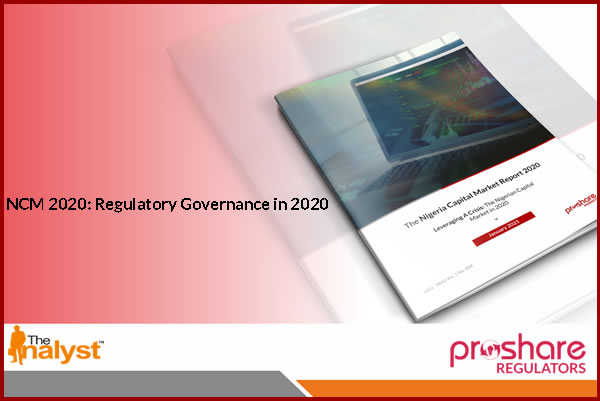
 1504 views
1504 views


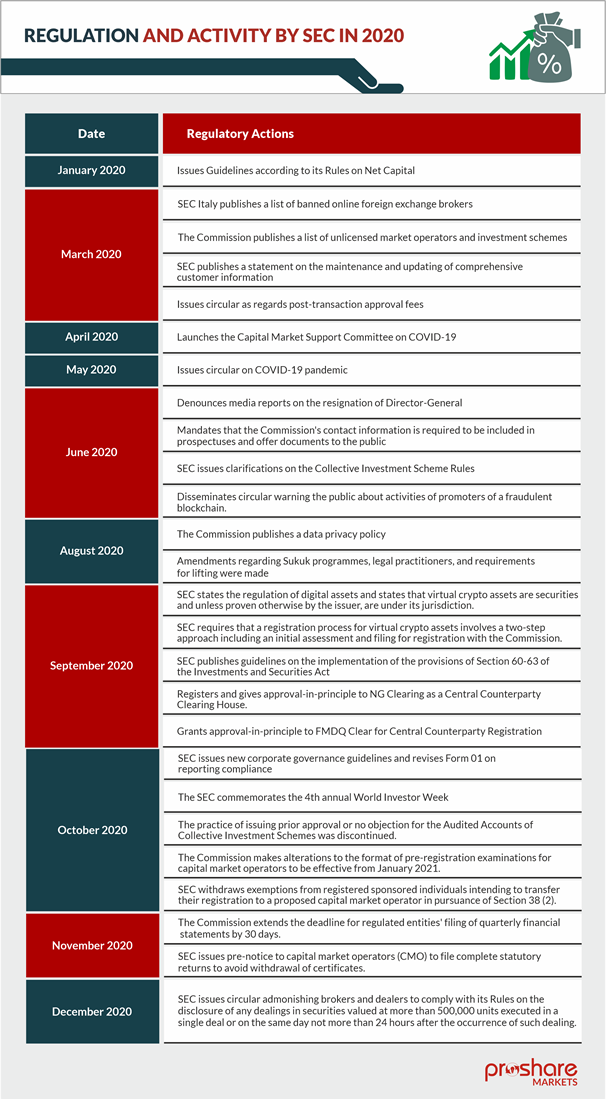


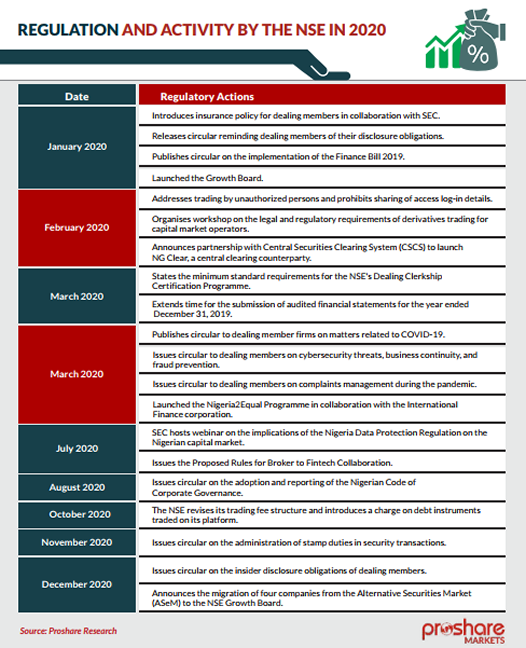

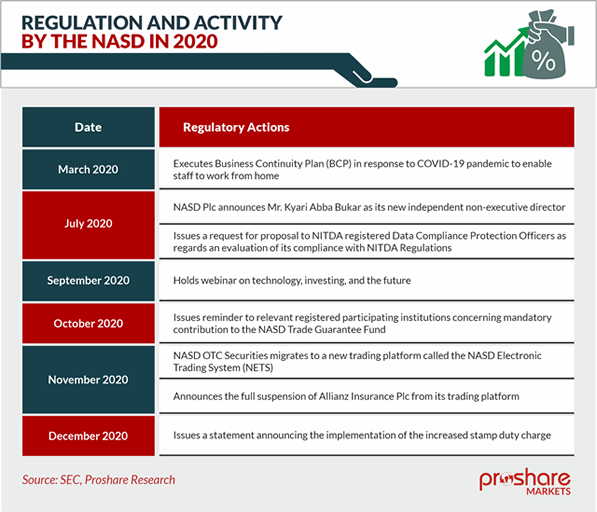
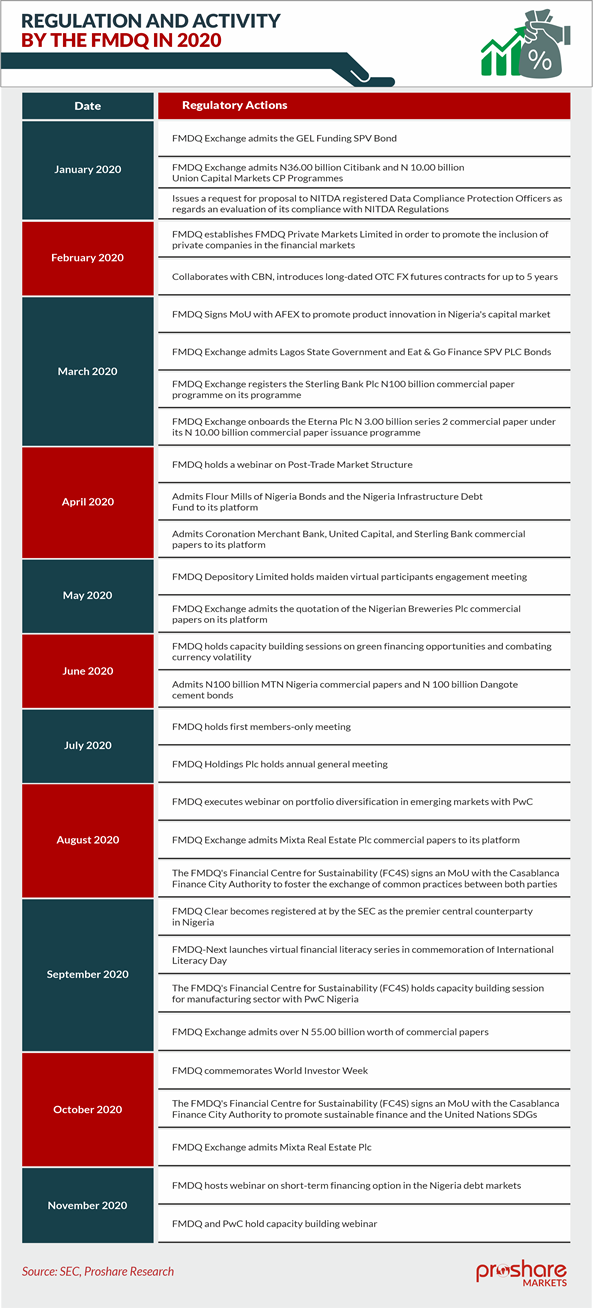


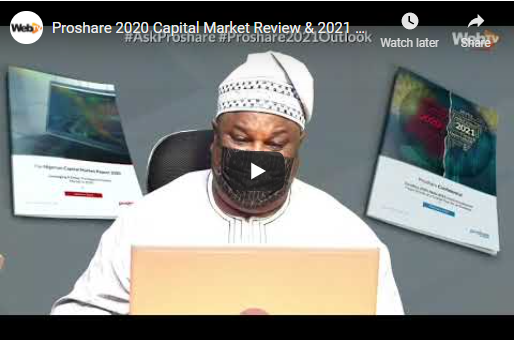


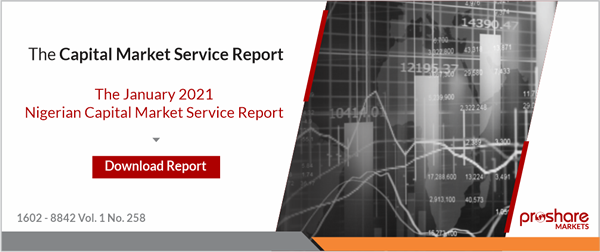




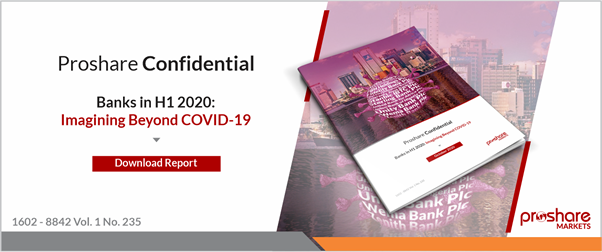


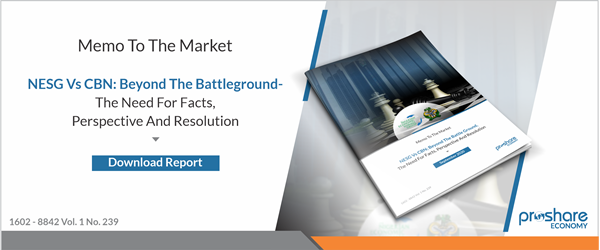





 Sponsored Ad
Sponsored Ad
 Advertise with Us
Advertise with Us









